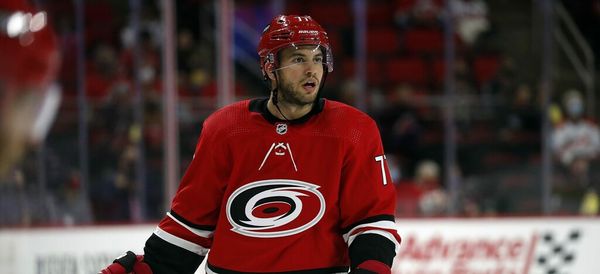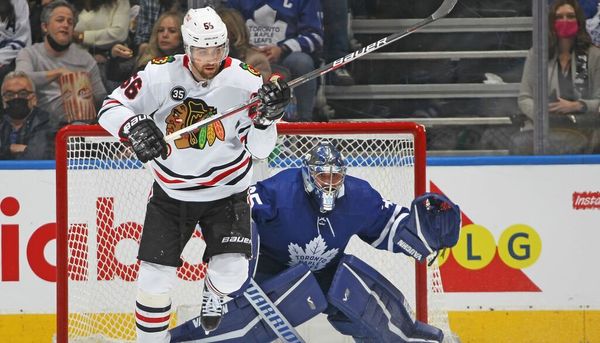PHILADELPHIA — The Flyers acquired defenseman Tony DeAngelo on Friday from the Carolina Hurricanes, and it was the wrong kind of move for the wrong kind of player for all the wrong reasons.
For DeAngelo and a seventh-round draft pick, general manager Chuck Fletcher and the rest of the Flyers’ leadership surrendered three draft picks — a second-rounder in 2024, a third-rounder in ‘24, and a fourth-rounder Friday — and any benefit of the doubt that they understand the dilapidated condition of the franchise and the time required to repair it.
DeAngelo is 26, a native of Sewell, N.J., one of the NHL’s better offensive-minded defensemen, a talented player who can quarterback a power play. None of these attributes are in dispute. Under certain circumstances, trading for such a player makes all the sense in the world. The problem for the Flyers is that none of those circumstances apply to them.
They are rebuilding. No, correction: They should be rebuilding, not retooling. They should be looking to tomorrow, not living for today. They should not be thinking about next season, not in any meaningful, team-building way. They don’t have the organizational talent and depth to be sacrificing draft picks to fill an immediate need, which is all that DeAngelo, even in an ideal scenario, would do.
The Flyers, especially with Ryan Ellis’ short- and long-term availability in such question, were shopping for a right-handed-shooting defenseman. DeAngelo is a right-handed-shooting defenseman, but his presence will do little beyond making what was an uncompetitive team last season marginally better next season.
They’re making, in principle, the same mistake that the NBA’s Portland Trail Blazers made in 1984, when they selected Sam Bowie with the No. 2 pick in the draft — and passed on Michael Jordan — because they “needed a center” and already had Clyde Drexler. A club at the bottom of its league should be doing everything it can to hoard as many high draft picks and as many young, cost-effective players as it can, regardless of those players’ positions. A trade such as this one, a trade that costs the Flyers two net picks for the sake of plugging a roster hole, is not a trade they ought to be considering, let alone making.
Sure, DeAngelo’s presence and any other offseason additions might renew some immediate interest in the team’s fortunes. But once the Flyers leave that trail of candy for their fans to follow to the Wells Fargo Center’s ticket office, and once that sugar rush wears off — and it will wear off, fast — then what?
Once again, the Flyers are being squishy about the task ahead of them, too timid to acknowledge that it will take them years to recover from their two decades of poor drafting and this most recent stretch of not quite breaking it all down and not quite going all in. This is a fan base that needs to eat its vegetables, and this is a franchise that needs to start tending to its garden.
Can you count on him?
Never mind the risks and downsides that DeAngelo himself presents. There will be much made of his political views, of his explicit support on social media of Donald Trump. But those details are less interesting and less relevant than DeAngelo’s history as a disruptive force in several locker rooms. From Colin Kaepernick to Tom Brady, from Curt Schilling to Kyrie Irving, plenty of athletes have opinions that fall on the far ends of the sociopolitical and racial spectrums, that are objectionable or uninformed or eccentric, radical or reactionary. They’re just like the general public in that regard.
What matters more, once the puck drops or the ball is tipped, is whether an athlete can be counted on to support his or her teammates, to compete with and for them at all times, and DeAngelo’s track record suggests he can’t be. He has been too willing throughout his career to cross the line that separates a controversial or downright repugnant thought from a damaging action.
Twice during his junior career, he was suspended for violating the Ontario Hockey League’s harassment, abuse, and diversity policy, and the league confirmed that in at least one of those incidents, DeAngelo used a slur against his own teammate. Twice, once in juniors and once with the Arizona Coyotes, he was suspended for abusing an official. Twice, former Rangers coach David Quinn benched him for on-ice outbursts, and the team eventually waived DeAngelo after he precipitated a postgame game fight with goaltender Alexandar Georgiev by insulting Georgiev during a game.
Given that background, DeAngelo will have to go a long way to prove that he has grown up and gotten past such nasty, petulant behavior. And he’ll have to do it under a fiery head coach, John Tortorella, who has shown little patience for such antics in the past.
‘He’s paid the consequences’
“We actually did a lot of due diligence last summer,” Fletcher told reporters Friday at the NHL draft in Montreal. “Tony has played on a lot of teams now. He’s somebody [who has] certainly had some incidents in his past, probably gotten into trouble. He’s paid the consequences for those actions. We believe he’s learned from them.”
Even if he has, so what? The decision to make this trade, then sign DeAngelo to a reported two-year contract worth $10 million, reflects deeper issues within the Flyers than any public-relations nightmares or locker-room fissures he might yet cause.
It shows that they still believe that buying a lottery ticket is preferable to the cold logic and hard work of a slow and steady climb. It shows that they still don’t understand fully how far they’ve fallen and how long it will take them to get back up. Wrong move. Wrong guy. Wrong way of thinking. Is this ever going to change?










